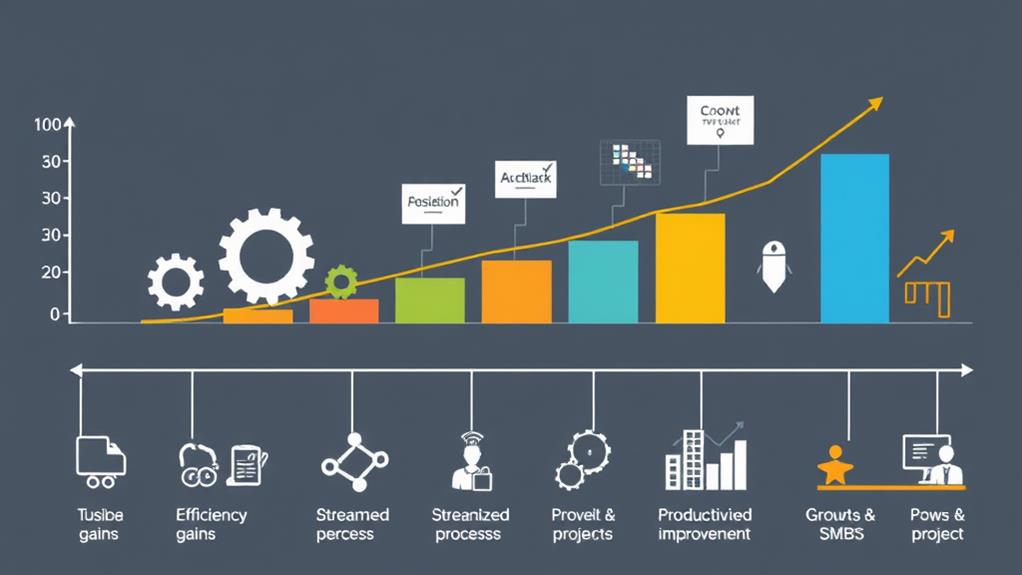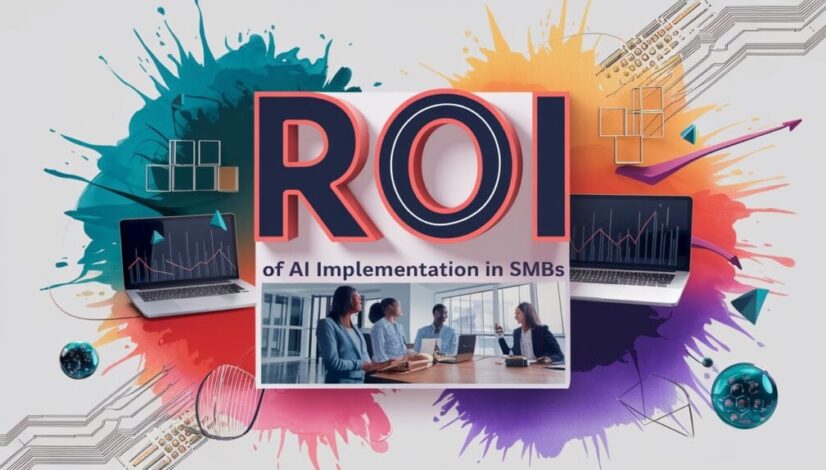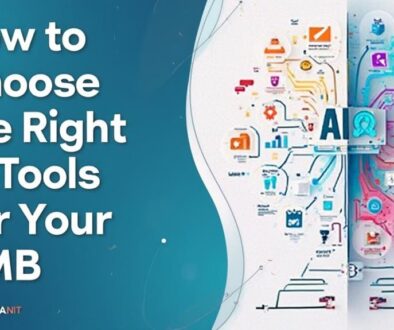The ROI of AI Implementation in SMBs
The ROI of AI implementation in small and medium-sized businesses (SMBs) is significant, with operational efficiency and data-driven decision-making at its core. AI enhances marketing strategies by boosting engagement, potentially increasing revenue by 10-15%. Supply chains benefit from prediction capabilities, reducing stock disparities by 30%. Long-term gains in productivity can reach 25% through improved training systems. Although initial investments and ongoing maintenance impact overall costs, the operational savings and increased customer loyalty yield favorable returns. For those interested in leveraging AI effectively, understanding the nuances of proper implementation is essential. Insights into specific applications and success stories can offer further guidance.
Key Takeaways
- AI enhances operational efficiency, leading to significant long-term cost reductions and improved decision-making in SMBs.
- Initial investments in AI tools yield a return through increased revenue and reduced operational costs over time.
- AI-driven marketing and supply chain optimizations can boost revenue by 10-15% and decrease stock disparities by 30%.
- Enhanced data analytics capabilities improve forecasting accuracy and facilitate informed decision-making, driving business growth.
- Ongoing training and employee support are essential for maximizing AI’s ROI and ensuring successful implementation.
Understanding AI’s Value Proposition

The value proposition of artificial intelligence (AI) in small and medium-sized businesses (SMBs) lies in its transformative potential to enhance operational efficiency and decision-making processes. By employing AI solutions, SMBs can considerably improve their ROI assessment through better data analytics, enabling a clearer understanding of their operational impact.
This capability offers a promising avenue for business integration, where AI can streamline workflows, automate repetitive tasks, and free up employees for higher-value activities.
However, successful AI implementation necessitates thorough employee training and technology adoption strategies. Closing the skills gap guarantees that personnel are equipped to leverage AI tools effectively, thereby contributing to a sustainable competitive advantage.
Investing in employee education fosters a culture of innovation, leading to enhanced productivity and improved performance metrics.
Moreover, the scalability potential of AI solutions cannot be overstated. As SMBs grow, AI systems can evolve alongside them, adapting to increased demands without requiring substantial reinvestment in new technologies.
This aligns with the broader objective of strategic alignment, as businesses can adapt their operational frameworks to better respond to market changes.
Key Areas Where AI Adds Value
Many SMBs find that AI offers considerable advantages across various operational domains. By harnessing advanced algorithms, businesses can enhance operational efficiency, reduce costs, and optimize resource allocation. One area where AI excels is in personalized marketing, enabling companies to tailor campaigns based on detailed customer segmentation analysis, ultimately driving higher engagement rates and conversion.
In supply chain optimization, AI predicts demand fluctuations and refines inventory management strategies. Organizations can guarantee they hold adequate stock levels through data-driven sales forecasting, minimizing excess inventory while preventing stockouts. This predictive capability extends to predictive maintenance, where AI analyzes machinery data to anticipate equipment failures, resulting in lower downtime and maintenance costs.
Moreover, AI considerably enhances employee training processes through adaptive learning systems that identify individual strengths and weaknesses, guaranteeing targeted development and better overall workforce performance.
In talent acquisition, AI-driven tools streamline the recruitment process, promoting efficiency in identifying and onboarding the right candidates.
Fraud detection is another critical area where AI models analyze transaction patterns, swiftly identifying anomalies, thereby safeguarding the business’s financial assets.
In this multifaceted landscape, AI not only streamlines processes but also fosters an environment where strategic decision-making is informed by real-time data insights. Ultimately, the implementation of AI fosters a culture of agility and responsiveness, empowering SMBs to navigate an increasingly competitive market landscape with confidence and precision.
Case Studies of Successful AI Use

Successful implementations of AI in small and medium-sized businesses (SMBs) illustrate its transformative potential across diverse sectors. Numerous AI success stories showcase how SMBs have leveraged technology to solve industry-specific challenges, thereby enhancing efficiency and profitability. For instance, a retail SMB integrated AI-driven inventory management, reducing stock disparities by 30%, resulting in commendable ROI benchmarks of 150% within the first year.
However, these success narratives come with notable complexities. Companies often face implementation timelines that may extend beyond initial expectations due to integration hurdles. In a case study of a service-based SMB, the integration of AI for customer interaction required extensive modifications to existing systems, leading to significant delays.
Additionally, scalability challenges emerged as the business sought to expand its AI capabilities, necessitating ongoing investments in both technology and infrastructure.
Employee training remains essential in the successful adoption of AI. An effective training program equipped staff with the skills necessary to harness AI tools, resulting in a 25% increase in productivity.
Ethical considerations also play a pivotal role; for example, businesses that prioritize transparent AI usage have reported enhanced customer trust and loyalty, thereby amplifying their market position.
These cases collectively illustrate that while the journey towards AI implementation is fraught with challenges, the potential for transformative outcomes makes it an endeavor worth pursuing for SMBs, emphasizing the need for strategic planning and adaptive measures.
Cost-Benefit Analysis of AI
A thorough cost-benefit analysis of AI implementation in SMBs requires a thorough assessment of initial investment considerations, which can include software, hardware, and training expenses.
However, the potential for long-term efficiency gains, such as increased productivity and reduced operational costs, must also be evaluated to provide a clear picture of value.
Additionally, examining risk mitigation strategies associated with AI adoption can further illuminate the financial implications, balancing upfront costs with future benefits.
Initial Investment Considerations
Investing in artificial intelligence (AI) technology presents a unique set of challenges and opportunities for small and medium-sized businesses (SMBs). Initial investment considerations necessitate a thorough cost-benefit analysis, especially under budget constraints that many SMBs face. Selecting the right technology is crucial; it can greatly influence both upfront costs and future scalability concerns.
Training costs represent another essential aspect, as effective implementation hinges on staff proficiency. Additionally, SMBs must foster vendor partnerships that align with their goals while ensuring dependable support throughout the implementation timeline.
Integration challenges are prevalent, often requiring substantial adjustments to existing systems, which may lead to operational disruption during the change. Return expectations should be realistic and based on clearly defined KPIs to measure AI’s impact effectively.
Acknowledging ongoing maintenance requirements is important, as these can influence the total cost of ownership over time. Ultimately, SMBs must weigh initial investments against potential long-term benefits to secure a strong position in an increasingly competitive landscape.
Through careful planning and analysis, businesses can navigate the complexities of AI implementation, paving the way for future growth and innovation.
Long-term Efficiency Gains
Long-term efficiency gains from artificial intelligence (AI) implementation can greatly reshape the operational landscape for small and medium-sized businesses (SMBs). By leveraging AI technologies, SMBs can achieve significant resource optimization, thereby streamlining processes and reducing operational bottlenecks. This optimization facilitates scalable solutions that adapt to business growth without a corresponding increase in overhead costs.
Consider the following benefits of AI-driven efficiency:
- Improved decision-making through data analytics, enabling better strategic insights.
- Enhanced customer engagement via personalized experiences, increasing loyalty and sales.
- Reduced operational costs through automation of repetitive tasks, freeing staff for higher-value activities.
- Increased scalability potential with AI systems that can easily adjust to changing business needs.
These long-term gains create a formidable competitive advantage for SMBs, allowing for greater flexibility and responsiveness in the market.
Organizations that embrace AI solutions can not only mitigate expenses but also enhance their capacity to innovate, ultimately securing a sustainable pathway towards growth and profitability. Consequently, the investment in AI transcends initial costs, fostering an environment of continual improvement and long-term success.
Risk Mitigation Strategies
In the domain of AI implementation, effective risk mitigation strategies are vital for guaranteeing that the anticipated benefits outweigh the associated costs. Conducting a thorough risk assessment is the first step in identifying potential pitfalls, such as data privacy concerns and compliance measures related to regulations.
Organizations must prioritize proper vendor selection to align with their strategic goals while fostering technology partnerships that enhance capability without compromising security.
Comprehensive employee training programs play a pivotal role in preparing staff for AI integration, minimizing resistance during change management processes. By investing in iterative testing of AI solutions, businesses can pinpoint issues early on, facilitating continuous improvement rather than costly overhauls down the line.
Stakeholder engagement is essential for fostering a culture of collaboration and trust, enabling transparency and adapting policies based on real feedback.
Ultimately, a responsive approach incorporating these risk mitigation strategies can bolster AI investments within small to medium-sized businesses, driving sustainable growth while safeguarding operational integrity. Implementing these strategies guarantees a balanced examination of costs and benefits, allowing organizations the freedom to innovate confidently.
Measuring AI Impact on Efficiency

Evaluating the impact of AI on efficiency within SMBs necessitates a quantitative approach to evaluate three critical aspects: increased workflow automation, streamlined decision-making processes, and enhanced data analytics capabilities.
By systematically measuring time savings, error reduction, and improved decision accuracy, organizations can ascertain the tangible benefits derived from AI integration.
In addition, leveraging key performance indicators (KPIs) allows SMBs to align AI initiatives with overarching business goals and drive continuous improvement.
Increased Workflow Automation
As organizations increasingly adopt AI technologies, the potential for enhanced workflow automation becomes evident, markedly influencing operational efficiency. By integrating AI into everyday processes, small to medium-sized businesses (SMBs) can realize significant advancements in workflow optimization. The benefits translate into tangible outcomes such as improved task prioritization, resource allocation, and process standardization.
The impact of increased workflow automation can be measured through:
- Time Savings: Automated tasks allow employees to focus on critical activities, enhancing productivity.
- Error Reduction: AI systems minimize human error, leading to more reliable outputs.
- Operational Scalability: Businesses can efficiently scale operations without a linear increase in resource input.
- Employee Engagement: With mundane tasks automated, employees can engage in more fulfilling work, fostering innovation and workforce satisfaction.
AI’s role in project tracking further enhances accountability, making it easier to monitor progress and measure success.
Additionally, robust software integration guarantees that disparate systems communicate effectively, streamlining operations.
Ultimately, AI-driven workflow automation not only increases efficiency but also positions SMBs for future growth by empowering them to allocate resources wisely and engage their workforce meaningfully.
Streamlined Decision-Making Processes
AI integration into decision-making processes greatly enhances the efficiency and effectiveness of small to medium-sized businesses (SMBs). Specifically, it facilitates data integration across various departments, breaking down information silos that traditionally impede progress. By harnessing predictive analytics, SMBs can leverage real-time insights to inform their strategies, leading to more agile responses to market changes and customer demands.
Moreover, the adoption of AI fosters improved team collaboration, allowing stakeholders to engage more seamlessly and ensuring that critical information flows transparently. This cultural shift towards embracing technology not only accelerates process optimization but also encourages a proactive approach to identifying and solving business challenges.
With AI-powered tools, decision-makers can analyze vast quantities of data quickly, reducing the time spent on manual processes and enhancing overall operational efficiency. Consequently, leveraging these capabilities empowers SMBs to make informed decisions that align with strategic goals, ultimately driving sustainable growth.
Therefore, the transformative impact of AI on decision-making processes underscores its critical role in enhancing organizational effectiveness and operational agility.
Enhanced Data Analytics Capabilities
The introduction of advanced AI technologies into small to medium-sized businesses (SMBs) not only optimizes decision-making processes but also greatly enhances data analytics capabilities. By leveraging machine learning algorithms and deep learning frameworks, SMBs can exploit vast amounts of data to extract actionable insights.
The prominence of predictive analytics enables these businesses to anticipate future trends, enhancing proactive strategies and competitive advantage.
The significant improvements in data analytics can be encapsulated in several key areas:
- Improved forecasting through trend analysis and predictive modeling.
- Enhanced data visualization tools that make complex data more accessible and understandable.
- Automated reporting, freeing up human resources for strategic initiatives.
- Real-time data processing, allowing for immediate response to market changes.
The integration of AI not only leads to more informed decision-making but also cultivates a data-driven culture within SMBs.
Enhancing Customer Experiences With AI
While many small and medium-sized businesses (SMBs) endeavor to deliver exceptional customer experiences, leveraging advanced technologies such as artificial intelligence can greatly enhance these efforts.
AI presents an opportunity to revolutionize personalized marketing, a critical strategy for engaging customers in today’s competitive landscape. According to a McKinsey report, businesses that implement AI-driven personalization can see an increase in revenue by up to 10-15% through improved customer targeting.
One of the most effective applications of AI in enhancing customer experiences is through intelligent customer support systems. Chatbots and virtual assistants utilize natural language processing to provide real-time assistance, addressing customer queries around the clock.
Research by Salesforce indicates that 69% of consumers prefer chatbots for quick communication with brands. This not only improves response time but also frees human agents to focus on more complex issues, thereby enhancing service efficiency.
Additionally, AI-driven analytics can sift through vast amounts of data to identify customer preferences and behaviors, enabling SMBs to deliver targeted promotions and tailored content.
This level of personalization fosters loyalty and encourages repeat business, driving long-term growth.
Data-Driven Decision-Making Benefits

Leveraging data-driven decision-making offers substantial advantages for small and medium-sized businesses (SMBs), transforming how they strategize and operate. By implementing advanced methodologies such as data integration and predictive analytics, SMBs can cultivate an environment that emphasizes operational transparency and strategic alignment. This shift not only bolsters market competitiveness but also facilitates innovation acceleration through well-informed choices.
Key benefits of adopting a data-driven approach include:
- Enhanced Real-Time Insights: Businesses can make swift, informed decisions based on the latest data trends, greatly reducing the lag time in responses to market shifts.
- Improved Performance Optimization: Systematic analysis of operational data empowers companies to fine-tune processes, leading to heightened efficiency and reduced costs.
- Strategic Stakeholder Engagement: Utilizing insights derived from data fosters stronger relationships with stakeholders by addressing their needs and expectations effectively.
- Robust Data Governance: Implementing coherent governance structures guarantees data integrity and security, enhancing trust and compliance.
Incorporating these elements into the decision-making framework allows SMBs to navigate complexities with greater agility. The focus on real-time insights fosters a culture where creativity and accountability coexist, ultimately promoting sustainable growth.
Challenges in AI Implementation
Despite the numerous advantages that AI can bring to small and medium-sized businesses (SMBs), implementing these technologies is fraught with challenges that can hinder their effectiveness. One primary hurdle is the lack of adequate resources. Many SMBs face significant resource constraints, which can restrict their capacity to invest in necessary tools and infrastructure, ultimately leading to budget limitations that stymie AI initiatives.
Skill gaps present another substantial challenge, as the successful integration of AI requires specialized knowledge that may not be readily available within the existing workforce. This shortfall necessitates additional training requirements, further complicating the implementation process.
Many organizations also encounter difficulties with technology integration, as harmonizing new AI systems with legacy platforms can be cumbersome and time-consuming.
Cultural resistance poses yet another significant obstacle. Mitarbeitern frequently express apprehension towards adopting AI, often viewing it as a threat to their roles. Effective change management strategies are essential to facilitate a culture that embraces AI innovations, requiring a deliberate focus on communication and employee involvement.
Vendor selection adds another layer of complexity; choosing the right partner is critical to ensuring compatibility and support for the desired outcomes. Performance metrics must be rigorously defined to assess the success of AI implementations, yet developing these metrics often proves to be an implementation hurdle in itself.
Ultimately, steering through these multifaceted challenges requires a well-structured approach, blending strategic foresight with organizational adaptability.
Future Trends in AI for SMBs

Emerging trends in AI for small and medium-sized businesses (SMBs) indicate a significant evolution in how these organizations can harness technology to drive growth and efficiency. Continued advancements in emerging technologies present SMBs with unique opportunities to gain a competitive advantage. By leveraging adaptive algorithms, businesses can enhance operational scalability and improve decision-making processes.
As we explore future trends in AI adoption, several key focus areas will likely define the landscape:
- Personalized Marketing: AI will enable SMBs to create targeted campaigns that resonate with specific customer segments, enhancing engagement and conversion rates.
- Industry Specific Applications: Tailored AI solutions will emerge, addressing unique needs within various sectors, from retail analytics to healthcare diagnostics.
- Workforce Transformation: As AI tools automate routine tasks, businesses will see shifts in workforce dynamics, prioritizing upskilling and redefining roles for greater value addition.
- Ethical Considerations: With the growth of AI solutions, the importance of ethical AI practices will grow, demanding transparent integration strategies that prioritize customer trust.
Incorporating these trends, SMBs can advance their customer engagement and strengthen their operational frameworks.
The prudent implementation of AI-driven approaches not only fosters an agile response to market demands but also positions these businesses strategically in an increasingly competitive landscape.
Frequently Asked Questions
What Industries Benefit Most From AI Adoption in Smbs?
Industries that benefit most from AI adoption in small and medium-sized businesses include healthcare, with innovations enhancing patient care, and retail, where analytics improve inventory management and customer insights.
Additionally, manufacturing efficiency is optimized through predictive maintenance. The financial sector utilizes AI for enhanced forecasting accuracy, while customer service leverages chatbots to improve responsiveness.
How Long Does It Typically Take to See ROI From Ai?
The journey to an impactful AI implementation timeline resembles a marathon rather than a sprint, with ROI typically materializing within 6 to 18 months.
Measuring AI success hinges on clearly defined objectives and KPIs, ensuring transparency in assessment.
As organizations adopt AI, initial costs may seem intimidating, yet sustained efficiency gains and enhanced decision-making capabilities often manifest, ultimately leading to significant long-term benefits.
Careful planning and realistic expectations are essential for traversing this transformative landscape.
Are There Specific AI Tools Recommended for Small Businesses?
For small businesses seeking to leverage AI, it is essential to explore various AI tool categories such as customer relationship management, marketing automation, and data analytics.
Cost-effective solutions like chatbots enhance customer engagement, while user-friendly platforms facilitate seamless integration.
Additionally, industry-specific tools can cater to unique business needs, allowing for tailored functionalities.
What Skills Are Needed for Effective AI Implementation in Smbs?
Steering the world of AI implementation is akin to orchestrating a symphony; each skill must harmonize to achieve a successful outcome.
Essential skills include data literacy to interpret and leverage insights, team collaboration to foster innovation, and change management to maneuver organizational shifts.
Additionally, technology integration and project management guarantee seamless execution, while a commitment to continuous learning is crucial for adapting to evolving AI capabilities.
Together, these skills empower SMBs to thrive in a dynamic landscape.
How Do I Begin an AI Implementation Strategy for My Business?
To commence an AI implementation strategy, first conduct thorough data analysis to identify areas of opportunity.
Establish a project management framework to guarantee structured execution and monitor progress.
Foster team collaboration by engaging relevant stakeholders throughout the process.
Consider budget constraints for both technology integration and employee training, assuring resources are allocated effectively.
Prioritize ongoing assessment and adaptation of strategies to maintain alignment with business objectives and to leverage emerging AI capabilities.
Conclusion
The implementation of AI in small and medium-sized businesses (SMBs) resembles steering through a complex labyrinth—initial challenges can obscure the pathway to substantial benefits. A 2023 study indicated that SMBs adopting AI reported a 40% increase in operational efficiency, akin to finding a shortcut through convoluted routes. By strategically harnessing AI, SMBs can enhance productivity, customer experiences, and decision-making processes, ultimately paving the way for sustainable growth in an increasingly competitive market.




